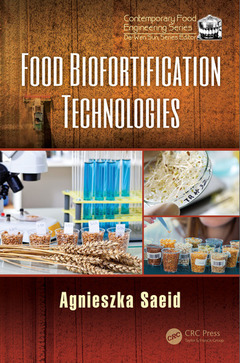Food Biofortification Technologies Contemporary Food Engineering Series
Coordonnateur : Saeid Agnieszka

Biofortification, which can be defined as the process of increasing the content/density of essential nutrients and/or its bioavailability of food with valuable compounds, is a promising means of increasing nutrient intakes. Traditional fortification practices in which exogenous nutrients are added to food can increase the content of nutrients but the use of biofortified foods with nutrients also may deliver the compounds in a more available form, as well as boost the overall relative effectiveness of these foods in raising nutrients status. Food Biofortification Technologies presents the state of the art in the field of novel methods of fortification and agricultural treatments as a way to improve the quality of obtained food products or compounds enriched with valuable nutrients. The book deals with fortification methods and agricultural treatments, which can improve the quality of food products or other agricultural compounds, providing them with a higher density of valuable nutrients. The utilization of novel products, such as feed additives and fertilizers, can avert nutrients depletion in food products. The book describes new and conventional methods of introducing valuable compounds into food components and presents the application of biosorption, bioaccumulation, and utilization of fertilizers in obtaining designer food. Attention is paid to the use of biomass as the carrier of nutrients such as microelements into the food components. The chapters are dedicated to specific food products and their nutrient components. The first chapter discusses the agronomic biofortification with micronutrients where the fertilization strategies are pointed out as a key to plant/cereals fortification. Other chapters present the fortification of animal foodstuffs such as meat, fish, milk, and eggs as well as the fortification of plant foodstuffs such as vegetables, fruits, and cereals. The book also explores advances in food fortification with vitamins and co-vitamins, essential minerals, essential fatty and amino acids, phytonutrients, and enzymes.
Chapter 1 Agronomic biofortification as a key to plant/cereal fortification in micronutrients
Agnieszka Saeid and Magdalena Jastrzębska
Chapter 2 Advances in food fortification with vitamins and co-vitamins
Malgorzata Korzeniowska, Aneta Wojdylo, and Angel Antonio Carbonell Barrachina
Chapter 3 Advances in food fortification with essential minerals
Izabela Michalak
Chapter 4 Advances in food fortification with essential fatty acids
Bogusława Łęska and Grażyna Czyżak-Runowska
Chapter 5 Advances in food fortification with essential amino acids
Ankit Goyal, Beenu Tanwar, Ami Patel, Nihir Shah, and Manvesh Sihag
Chapter 6 Advances in food fortification with phytonutrients
D. Suresh Kumar
Chapter 7 Fortification of dietary fibers in foods
Ami Patel, Ankit Goyal, Nihir Shah, and Manvesh Sihag
Chapter 8 Fortification of animal foodstuffs
Mariusz Korczyński, Robert Kupczyński,Marita Świniarska, Damian Konkol, and Sebastian Opaliński
Chapter 9 Fortification of plant foodstuffs
Łukasz Tuhy, Mateusz Samoraj, and Katarzyna Chojnacka
Agnieszka Saeid, Ph. D. graduated from Department of Chemistry of Wrocław University of Science and Technology in 2005. She obtained MSc in the field of Biotechnology, specialization Environmental Chemistry. The topic of MSc thesis was "Mineral feed additives based on biomass of microalga Spirulina sp." After graduation, she began Ph.D. studies at Institute of Inorganic Technology and Mineral Fertilizers, at Wrocław University of Science and Technology. During the study, she was granted a scholarship to participate in Postgraduate School of Industrial Ecology (PSIE) - IndEcol at Norwegian University of Science and Technology in Trondheim. In 2010 she defended her Ph.D. thesis on the application of a microalga Spirulina sp. as a carrier of nutritionally significant metal ions in animals feeding and became a lecturer at Wrocław University of Science and Technology. From 2012 she was appointed to the position of Professor Assistant at Institute of Inorganic Technology and Mineral Fertilizers, Wrocław University of Science and Technology. In the year 2016, she was granted scholarships funded by the Ministry of Science and Higher Education in Poland for young outstanding scientists. She continued research work on biosorption and elaboration new products based on natural biomass enriched via biosorption process as feed additives and fertilizers to obtain biofortified food products. In 2010 she got a grant financed by the Minister of Science and Higher Education on the project titled "An alternative method of manufacture of phosphate fertilizers by biological digestion of low-quality raw materials". In 2013 she got another grant financed by the National Centre for the Research and Development in Poland to continue research on the valorization of phosphorus-bearing wastes into phosphorus fertilizers with the utilization of microorganism. She has published over 77 papers, including 69 papers in world-known peer-reviewed scientific journals
Date de parution : 12-2017
15.6x23.4 cm
Thèmes de Food Biofortification Technologies :
Mots-clés :
Acyl Carrier Protein; biofortified foods; LC PUFA; proper nutrients balance in cultivation of plants; Composted Rice Straw; feed additives; Flax Seed; designer food; Pigeon Pea Flour; agricultural treatments; Improve Water Holding Capacity; novel method of fortification; DHA Content; Magdalena Jastrzębska; GRAS Status; Malgorzata Korzeniowska; EPA Content; Aneta Wojdylo; CLA Isomer; Angel Antonio Carbonell Barrachina; CLA Content; Izabela Michalak; Agronomic Biofortification; Bogusława ska; Food Fortification; Grażyna Czyżak-Runowska; Biofortified Crops; Ankit Goyal; Foliar Fertilization; Beenu Tanwar; Se Fertilizer; Ami Patel; Foliar Application; Nihir Shah; Vitamin B12; Manvesh Sihag; Se Concentrations; D; Suresh Kumar; Zn Concentration; Mariusz Korczyński; Bergamot Juice; Robert Kupczyński; Green Banana Flour; Marita Świniarska; Seed Zn Concentration; Damian Konkol; Biofortification Program; Sebastian Opaliński; Soil Fertilization; kasz Tuhy; Mateusz Samoraj; Katarzyna Chojnacka



